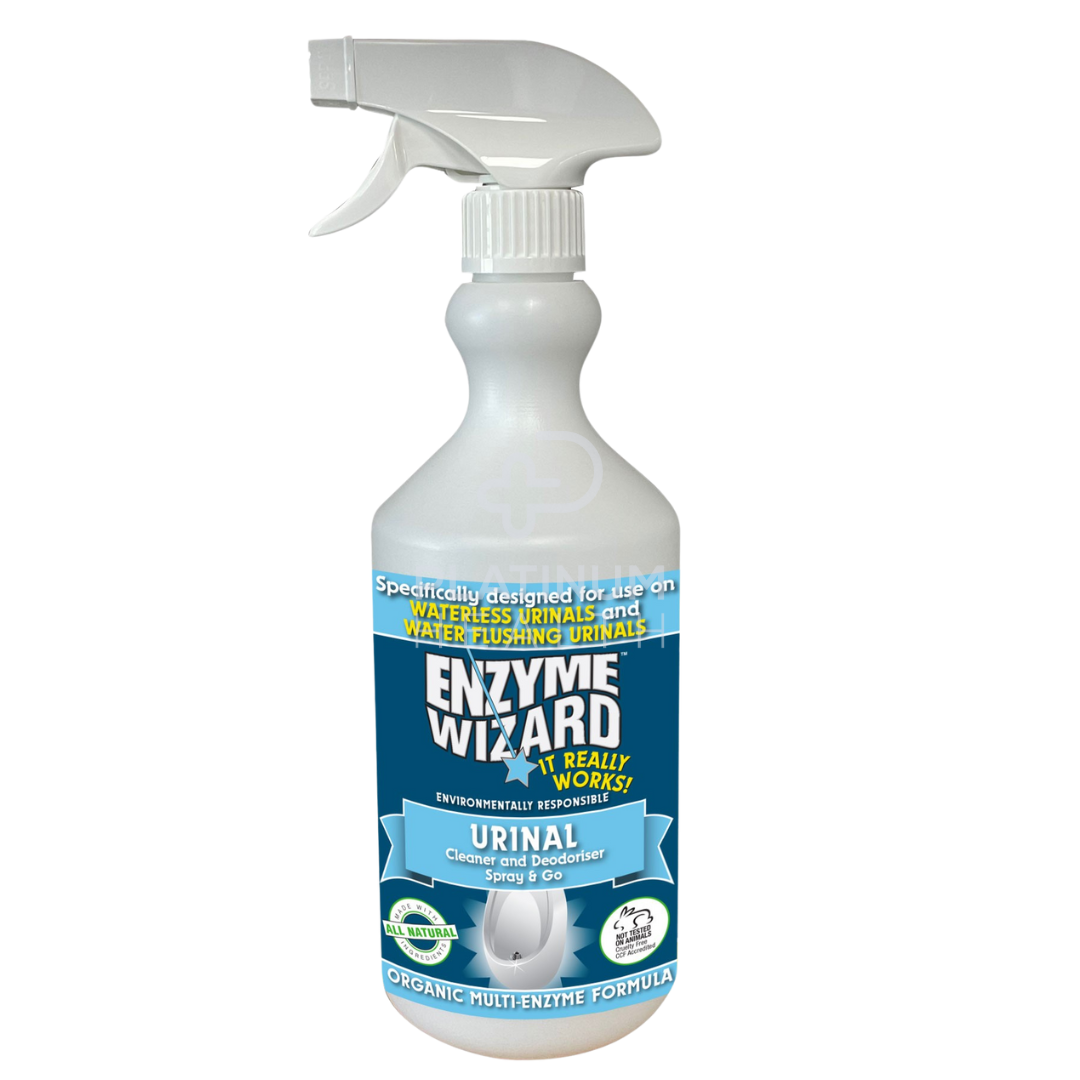Breaking Down Enzymatic Cleaners: How Do They Work?

If you manage a healthcare facility, aged care home, or support clients in the community, you already know that surface cleaning isn’t just about what looks clean. It’s about what actually kills odours, breaks down waste, and reduces infection risk.
That’s where enzymatic cleaners come in.
Unlike standard disinfectants or soaps, enzymatic cleaners use natural proteins (enzymes) to break down organic matter at the molecular level. We’re talking urine, blood, faeces, food spills, and other “real-life messes” that are common in care environments.
In this blog, we’ll break down how enzymatic cleaners work, when to use them, and how they stack up against traditional cleaning products.
What Makes Enzymatic Cleaners Different from Traditional Cleaners?
When you're comparing cleaning solutions for aged care, disability support, healthcare, or commercial use, it's worth asking: what exactly makes enzymatic cleaners different and why does it matter?
Let’s break it down.
Traditional Cleaners Focus on Killing Germs
Most conventional cleaning products—like bleach, ammonia, or general-purpose sprays—work by disinfecting surfaces. That means they kill bacteria, viruses, and mould using chemical agents.
This can be effective for sanitising high-touch surfaces like benches, handles, and toilets. But here's the catch: these cleaners don’t always remove the source of the mess. According to ABCD Clean, traditional disinfectants often clean the surface layer but leave behind microscopic organic residue.
And that leftover matter? It can feed new bacteria, cause odours to resurface, or allow stains to reappear.
Enzymatic Cleaners Break Down Organic Waste
Enzymatic cleaners use targeted proteins (enzymes) that digest and dissolve biological materials like urine, blood, vomit, food waste, and grease. This process breaks down complex molecules into smaller, water-soluble particles that can be rinsed or wiped away completely.
Finice Cleaning notes that enzymatic cleaners work at a molecular level, making them ideal for deep-cleaning environments where odour, hygiene, and contamination are ongoing concerns.
They don’t just kill bacteria. They eliminate what bacteria thrive on.
Gentler on People, Safer for Surfaces
Another big advantage? Enzymatic cleaners are usually non-toxic, pH-balanced, and biodegradable. That makes them safer for people with respiratory sensitivities, skin conditions, or allergies and much more suitable for settings where children, elderly clients, or immunocompromised people are present.
Plus, they're less likely to damage delicate surfaces like upholstery, flooring, or medical equipment, which may react poorly to harsh chemicals over time.
When Should You Use an Enzymatic Cleaner?
Enzymatic cleaners aren’t your everyday spray-and-wipe solution, but when used correctly, they’re a powerhouse for removing tough, organic messes that traditional cleaners just can’t handle.
According to Make It Clean, these cleaners are ideal for environments where hygiene and odour control are essential, especially when the mess involves bodily fluids, food waste, or protein-based stains.
Here’s when to reach for enzymatic products:
When Cleaning Up Bodily Fluids
Enzymatic cleaners excel at breaking down urine, blood, faeces, vomit, and sweat, making them ideal for aged care facilities, disability support, hospitals, or home care environments. These are the types of messes that don’t just leave a stain; they leave behind bacteria-feeding residue and unpleasant odours.
Use them on: Bedding, mattresses, commodes, floors, and clothing after incontinence or wound care incidents.
When Odour Just Won’t Go Away
Unlike air fresheners or disinfectants that mask smells, enzymatic cleaners target the actual cause of the odour. As Infinitabiotech explains, these cleaners break down organic compounds that generate foul smells, offering longer-lasting results, especially in places like bathrooms, laundry rooms, or kitchens.
Use them on: Hard surfaces, grout, bins, toilets, drains, and even pet areas.
When Cleaning Protein-Rich Stains (Think Food, Milk, or Grease)
Spilled milk. Dried egg. Food prep residue. All of these contain proteins that can harden, rot, and leave long-lasting smells or biofilms. Enzymatic cleaners are built for these kinds of messes because they “digest” proteins at a molecular level, iideal for kitchens, cafeterias, and even medical food prep areas.
Use them on: Benchtops, kitchen floors, aged care dining rooms, high chairs, and uniforms.
When You're Managing Sensitive Environments
Enzymatic cleaners are naturally biodegradable, non-corrosive, and often pH neutral. That makes them ideal for cleaning around vulnerable people—like the elderly, immunocompromised patients, or children—where harsh chemicals might not be suitable.
Use them in: Aged care rooms, paediatric clinics, community homes, NDIS support environments, and veterinary care facilities.
Which Enzyme Wizard Products Are Right for Your Facility?
Enzyme Wizard offers a professional-grade cleaning range that tackles organic messes while being safe for staff, patients, and the environment. Whether you’re cleaning aged care rooms, bathrooms, kitchens, or public bins—these formulas work hard without the harsh chemicals.
Here’s how to choose the right cleaner for the right job:
1. Enzyme Wizard Floor Cleaner
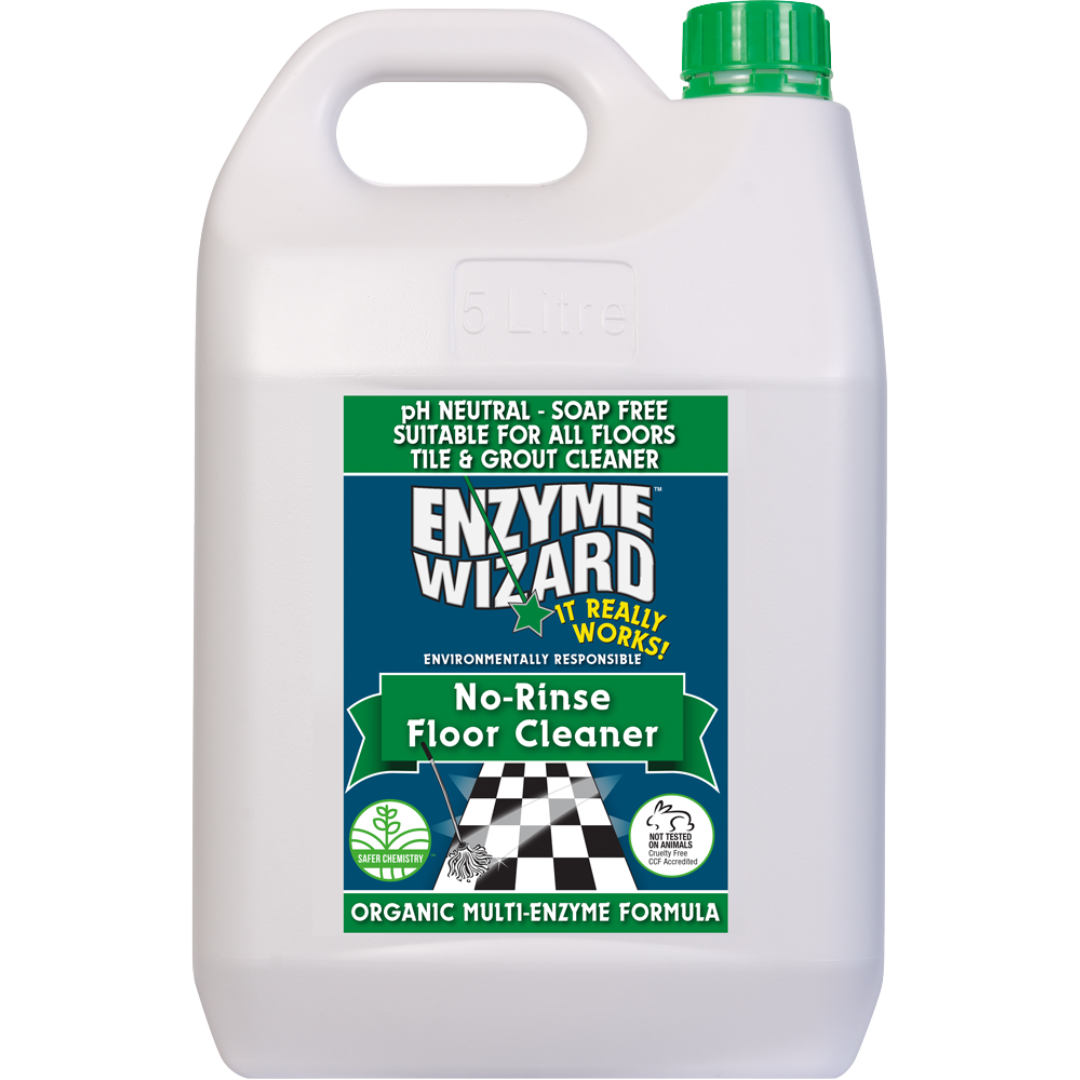
This low-foaming concentrate is designed for aged care, hospitality, and clinical flooring. It breaks down grease, grime, urine, and food spills without leaving sticky residue—ideal for mopping high-traffic areas.
Why you’ll love it:
- pH neutral and safe on vinyl, tile, and wood
- No need to rinse
- Ideal for daily cleaning in care environments
Best for: Facilities needing a safe, streak-free clean with odour control.
2. Enzyme Wizard Surface Sanitiser

Combines powerful enzymatic action with gentle surface sanitising. Suitable for benchtops, bedsides, and shared touch points, especially in NDIS, hospital, or aged care settings.
Why you’ll love it:
- Breaks down organic residue
- Fragrance-free and non-toxic
- Ready to use or dilute
Best for: Infection control in shared spaces where odours or bodily fluids are present.
3. Enzyme Wizard Bathroom & Kitchen Spray
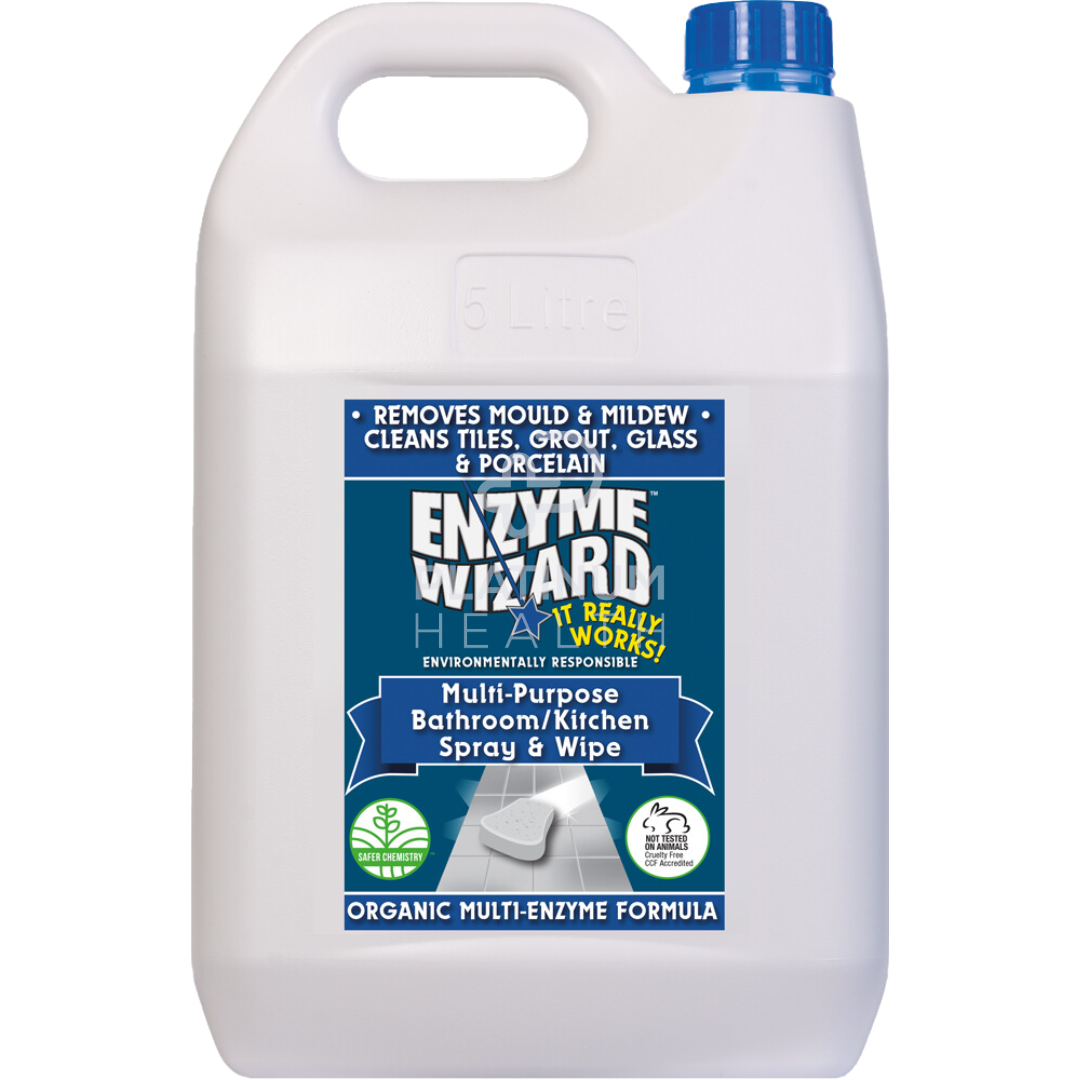
A versatile cleaner for hard-to-clean spaces like showers, sinks, and benches. It lifts grease, grime, soap scum, and food waste, all while keeping the area safe for sensitive users.
Why you’ll love it:
- No harsh fumes
- Cuts through build-up quickly
- Safe around food surfaces
Best for: Commercial kitchens, care home bathrooms, or shared home living.
4. Enzyme Wizard Carpet Cleaner
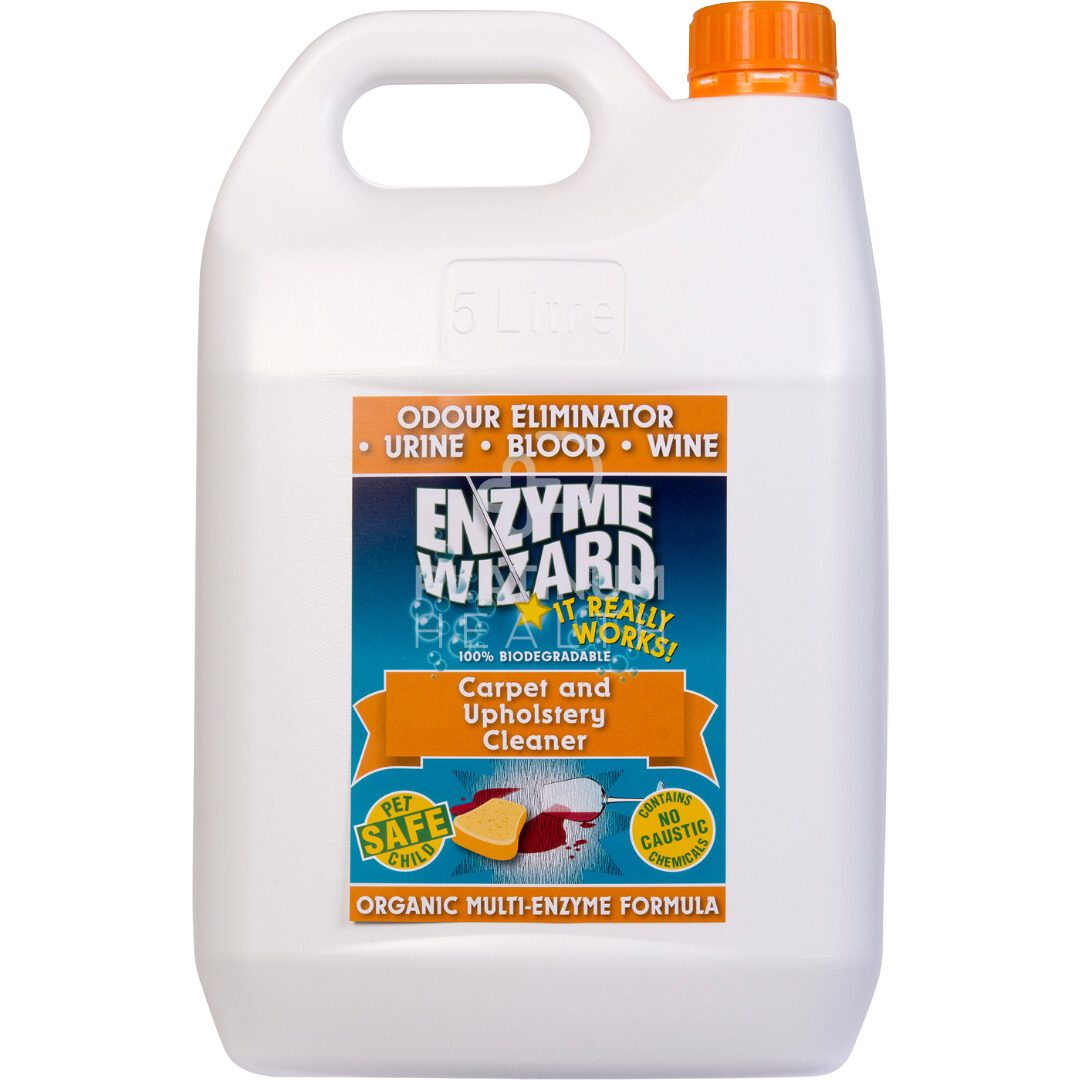
Penetrates deep into carpet fibres to break down odours, stains, and allergens. Works on urine, vomit, milk, and more—without leaving residue or chemical smells.
Why you’ll love it:
- Pet-safe and child-safe
- Effective for both spot cleaning and machine use
- Lifts stains from fabric and upholstery too
Best for: Group homes, daycares, aged care rooms, and waiting areas.
5. Enzyme Wizard Urinal Cleaner & Deodoriser
Targets uric acid and odour-causing bacteria at the source rather than masking it. Designed for commercial bathrooms and high-use facilities.
Why you’ll love it:
- Ready-to-use spray
- Controls scale and smell in urinals
- Safe on porcelain and stainless steel
Best for: Public or facility washrooms with persistent urine odour.
6. Enzyme Wizard Wheelie Bin Cleaner & Deodoriser
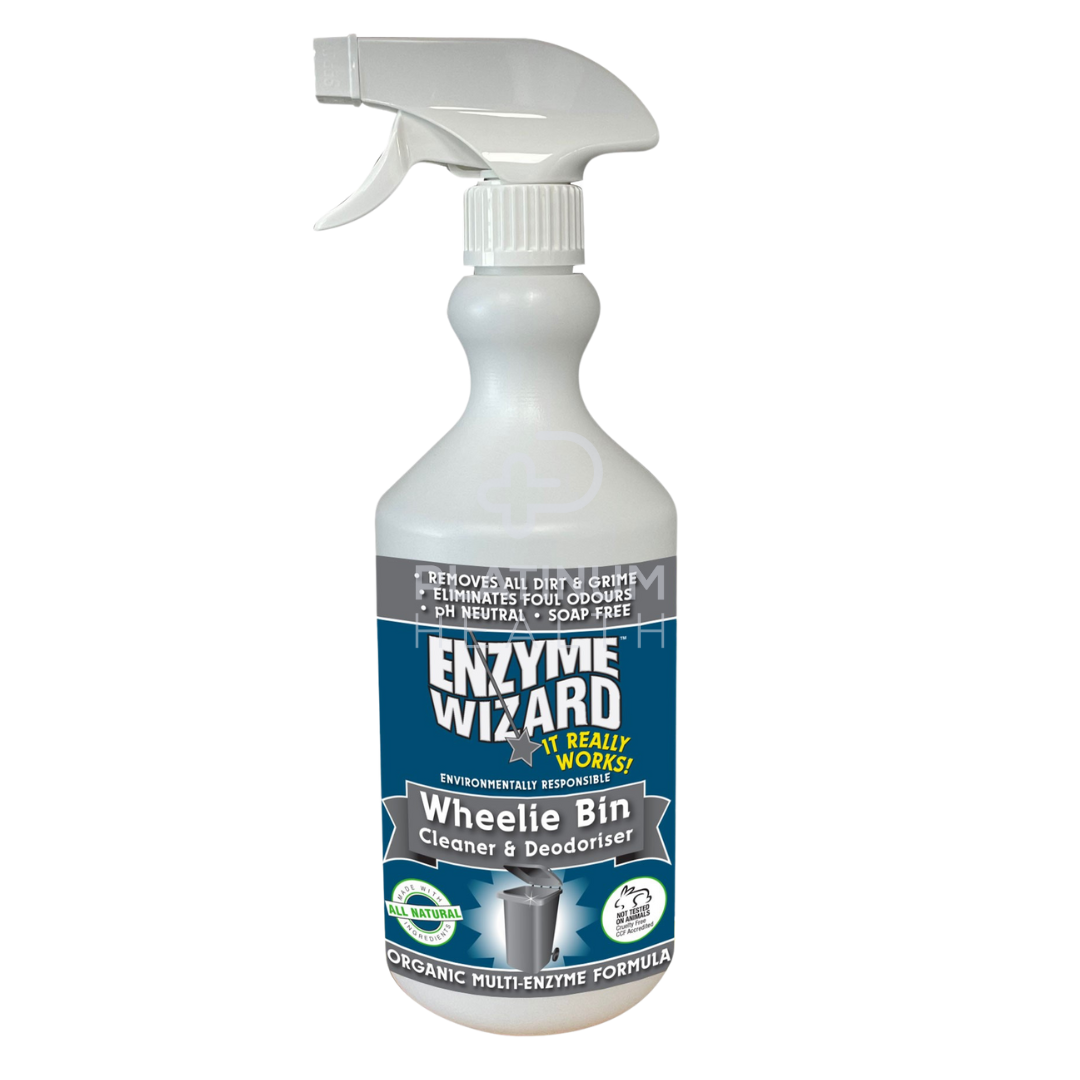
Forget overpowering bin sprays—this formula actually breaks down organic bin waste and neutralises the odour-causing compounds.
Why you’ll love it:
- Fast-acting and biodegradable
- Removes bacteria, not just smells
- Great for aged care, commercial kitchens, or events
Best for: Bins exposed to food, waste, or bodily fluids.
7. Enzyme Wizard Glass & Stainless Steel Cleaner
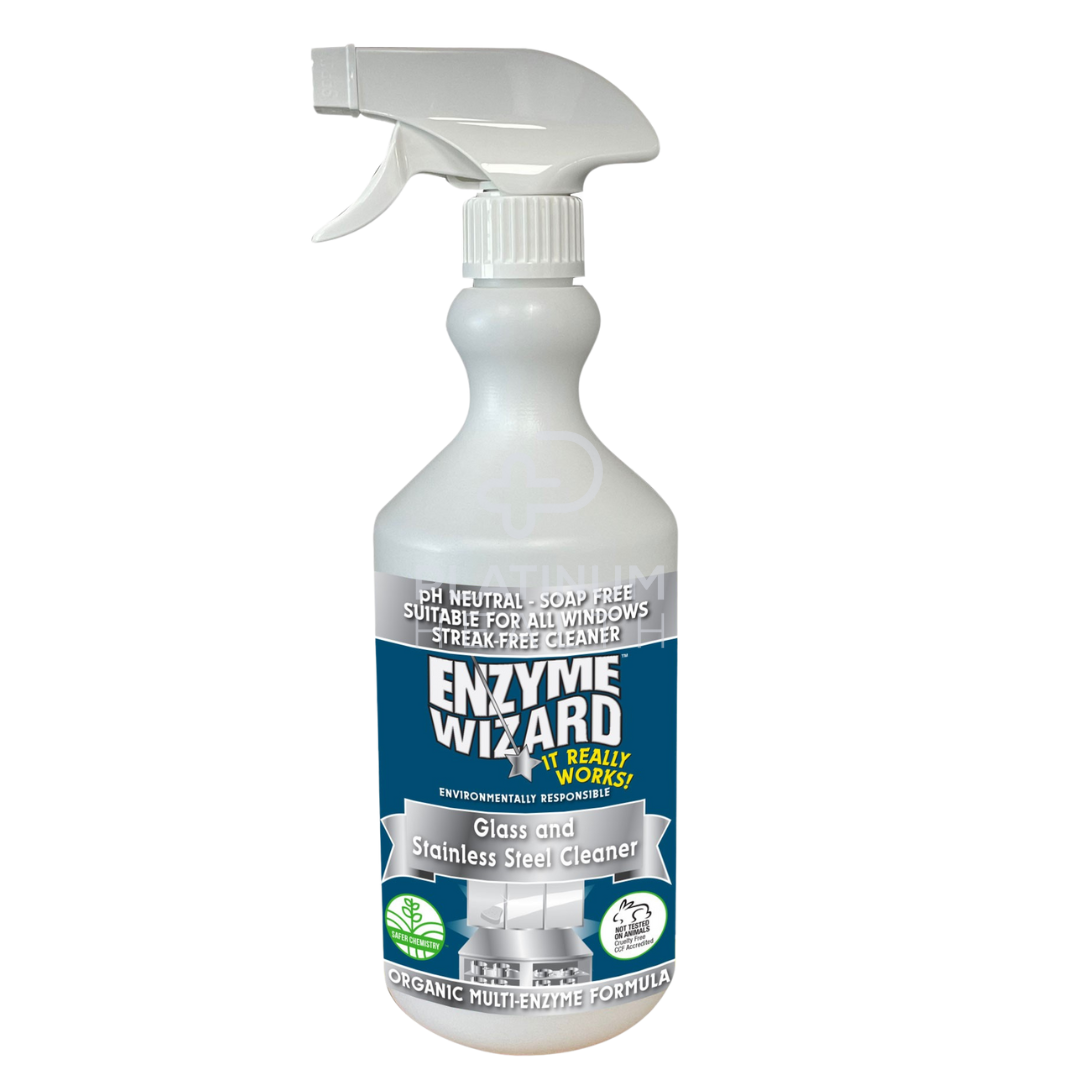
A streak-free finish without ammonia. Perfect for glass dividers, kitchen splashbacks, and stainless-steel equipment.
Why you’ll love it:
- Leaves no chemical residue
- Enzyme action helps reduce smudges over time
- Safe for sensitive settings
Best for: Hospitality, healthcare, and open-plan offices.
8. Enzyme Wizard Urine Stain & Odour Remover
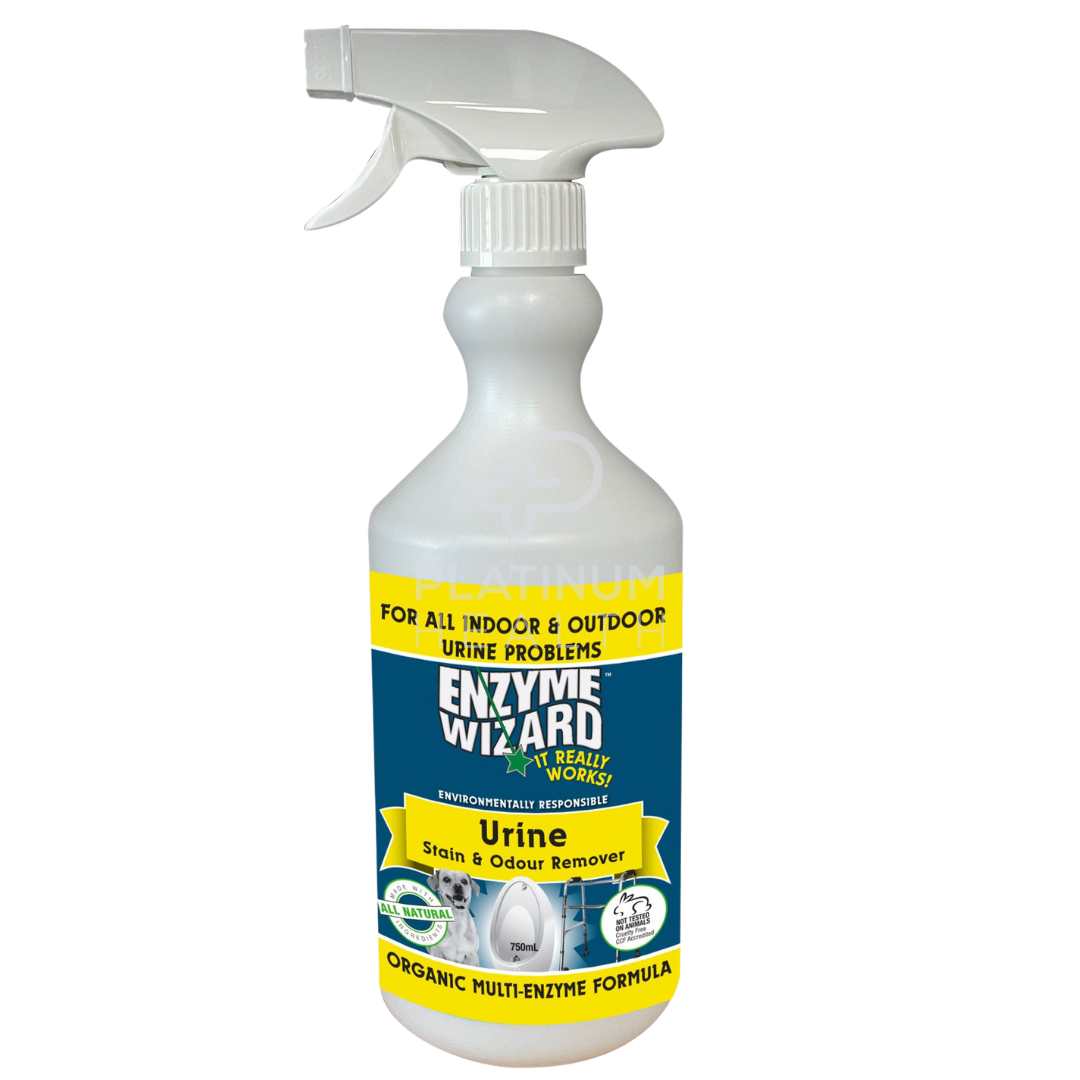
A specialist urine treatment for soft and hard surfaces. Gets to the root of odour-causing crystals and residue.
Why you’ll love it:
- Safe on carpets, mattresses, chairs, and tiles
- Pet, child, and aged-care friendly
- Fast acting—no scrubbing required
Best for: Care homes, NDIS providers, or home carers managing incontinence.
9. Enzyme Wizard Grease & Waste Digester
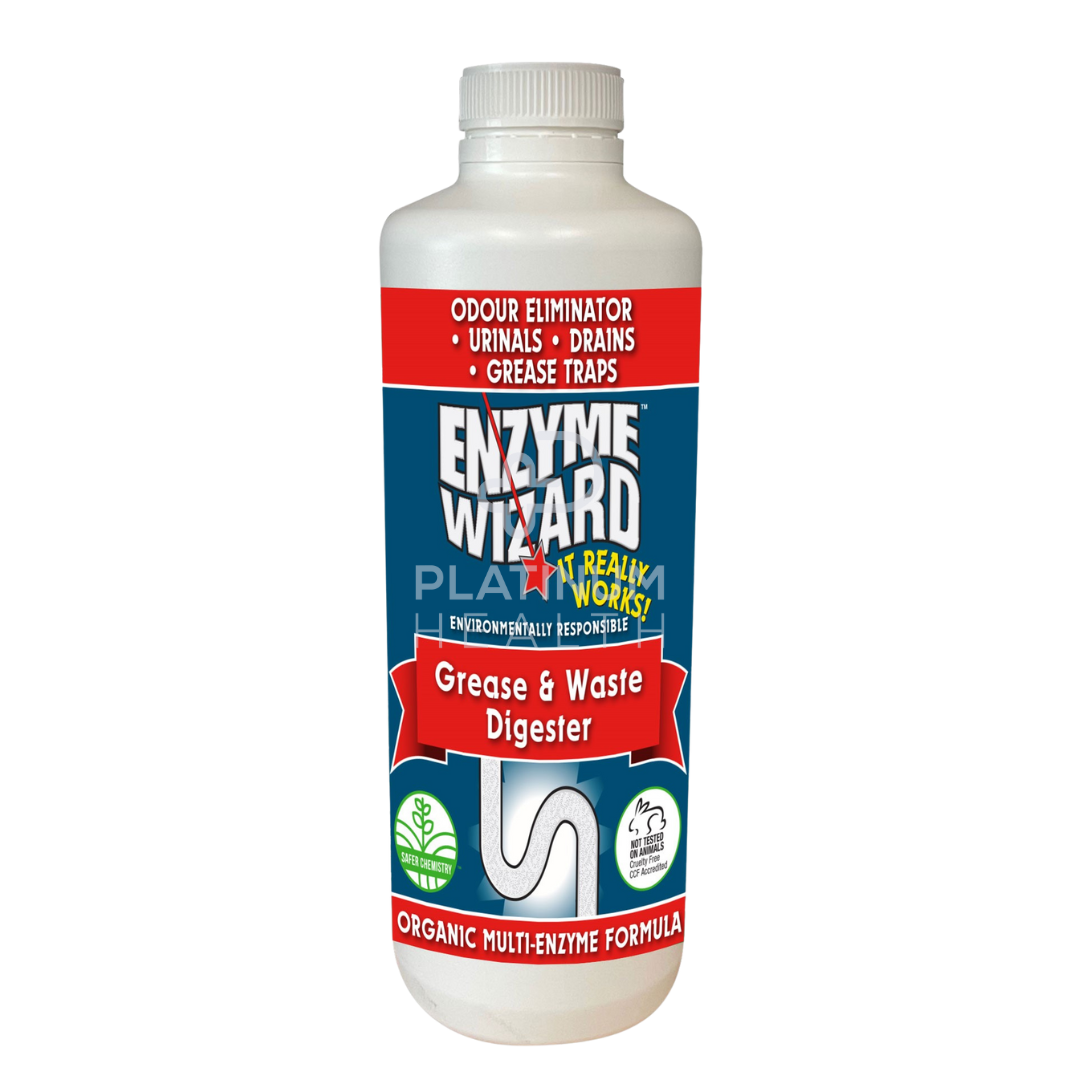
Breaks down fats, oils, and grease (FOG) in kitchen drains and grease traps. Designed to reduce blockages and plumbing calls.
Why you’ll love it:
- Can be used in pipes, drains, and traps
- Helps prevent odour and slow drainage
- Naturally digests kitchen waste
Best for: Hospitality venues, food prep areas, and aged care kitchens.
10. Enzyme Wizard Descaler
[PRODUCT IMAGE]
Gently dissolves calcium, lime, and mineral build-up on taps, showerheads, tiles, and more—without harsh acids.
Why you’ll love it:
- Non-corrosive formula
- Safe on chrome and grout
- Pleasant fragrance, easy rinse
Best for: Facilities with hard water or recurring limescale build-up.
How Do You Use Enzymatic Cleaners Properly?
Enzymatic cleaners aren’t quite the same as your typical spray-and-wipe product and that’s a good thing. To get the most out of them, it’s important to use them a little differently. When used correctly, they not only clean more effectively but also prevent stains and odours from coming back.
Here’s how to apply enzymatic cleaners for best results:
1. Give It Time to Work
Unlike bleach or ammonia, enzymatic cleaners don’t zap mess instantly. The enzymes need time to break down organic material like urine, faeces, blood, grease, or food waste at a molecular level.
Tip: Spray the area thoroughly and allow it to sit for 5–10 minutes (or longer if directed) before wiping or rinsing. For heavy soiling, reapply and repeat as needed.
2. Avoid Mixing with Chemicals
Enzymes are biological proteins, not harsh chemicals. That means they’re effective, but also sensitive. Mixing enzymatic cleaners with disinfectants, bleach, or acidic products can kill the active enzymes and stop them from working.
Tip: Use enzymatic products before applying chemical sanitisers, or better yet, clean with enzymes alone in sensitive environments like aged care or NDIS support settings.
3. Use on Organic Mess Only
These cleaners are made for messes with organic components—think urine, vomit, faeces, blood, food spills, milk, grease, and sweat. They’re not designed for general dust or inorganic dirt.
Tip: For standard surface dust or mineral build-up, use a surface-specific product like the Enzyme Wizard Descaler instead.
4. Don’t Rinse Too Early
It’s tempting to spray and wipe quickly—but that won’t give the enzymes enough time to do their job. If you're wiping too soon, you're removing the enzymes before they’ve had a chance to break down the mess.
Tip: Always follow dwell-time instructions on the label, and only rinse if instructed.
5. Dilute Only When Directed
Some products, like the Enzyme Wizard Floor Cleaner, are concentrates and should be diluted for safe and effective use. Others—like the Urine Stain & Odour Remover—are ready to go straight from the bottle.
Tip: Always check the label for mixing ratios and application instructions to get the best result (and save product).
Smarter Cleaning Starts with the Right Solution
Whether you're managing a care home, supporting NDIS clients, or just tired of battling lingering odours in shared spaces, enzymatic cleaners offer a powerful, people-safe alternative to harsh chemicals. They don’t just cover up mess. They remove it at the source, making your job easier and your environment safer.
Still not sure which formula suits your needs best? We’ve got you covered.
Visit our Epping showroom
Speak with our friendly team, explore the full Enzyme Wizard range, and get tailored advice for your cleaning setup.
Unit 2/51 Trafalgar Road, Epping VIC
Weekdays, 9am–5pm
Or browse our full collection online and order with confidence: Shop Enzyme Cleaners at Platinum Health Supply
Let’s take the guesswork out of mess, from floors to bedsides and everything in between.
Important Disclaimer
The information provided in this blog is for general educational purposes only and is intended to help customers better understand how enzymatic cleaners work and where they may be beneficial.
While every effort has been made to ensure accuracy, Platinum Health Supply is not liable for any misuse, improper application, or adverse outcomes resulting from the use of the products mentioned. Always follow the manufacturer’s instructions and safety guidelines provided on the product label or technical sheet.
Enzymatic cleaners are powerful tools when used correctly. If you are unsure about the suitability of a product for your environment or cleaning protocols, we recommend consulting with your facility manager, infection control officer, or the product manufacturer directly.
Using products outside their intended purpose or ignoring dwell times, dilution instructions, or safe handling practices may result in ineffective cleaning or damage to surfaces. Please use responsibly.
